- and lack of nutrients is an overlooked problem
 According to the statistics, far too many patients contract an infection while being hospitalized in a Danish hospital. This has enormous human and economic costs that need to be addressed. Hospital infections are not only a consequence of poor hygiene, it actually turns out that 40 percent of the patients are malnourished to some degree, which impairs their immune system and makes them an easier target for infections. Lack of vitamin C, vitamin D, selenium, zinc, and iron seem to be the big and overlooked problem.
According to the statistics, far too many patients contract an infection while being hospitalized in a Danish hospital. This has enormous human and economic costs that need to be addressed. Hospital infections are not only a consequence of poor hygiene, it actually turns out that 40 percent of the patients are malnourished to some degree, which impairs their immune system and makes them an easier target for infections. Lack of vitamin C, vitamin D, selenium, zinc, and iron seem to be the big and overlooked problem.
- but researchers warn against reduced intake levels
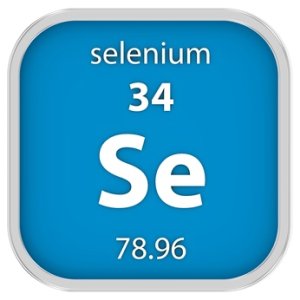 Even if you eat a healthy and balanced diet, it can be difficult to get enough selenium because of climate changes and nutrient depletion of the soil, especially in Europe. This was shown in a study conducted by Swiss scientists. Selenium is very important for the immune system, but how much do we need to be optimally protected against infections? There also appears to be a connection between widespread selenium deficiency and the increased rate of cancer.
Even if you eat a healthy and balanced diet, it can be difficult to get enough selenium because of climate changes and nutrient depletion of the soil, especially in Europe. This was shown in a study conducted by Swiss scientists. Selenium is very important for the immune system, but how much do we need to be optimally protected against infections? There also appears to be a connection between widespread selenium deficiency and the increased rate of cancer.
 According to a new study from Johns Hopkins University in the United States, vitamin D is able to protect overweight children against asthma caused by urban air pollution. Sunshine during the summer period is the main source of vitamin D, but due to our modern lifestyles, many people, including children, fail to get enough of the nutrient. This may have widespread consequences, as lack of vitamin D also increases the risk of overweight.
According to a new study from Johns Hopkins University in the United States, vitamin D is able to protect overweight children against asthma caused by urban air pollution. Sunshine during the summer period is the main source of vitamin D, but due to our modern lifestyles, many people, including children, fail to get enough of the nutrient. This may have widespread consequences, as lack of vitamin D also increases the risk of overweight.
 Vitamin C is essential for the immune defense for a number of reasons. According to a review of 12 recent studies, vitamin C administered in sufficiently high doses can prevent severe COVID-19 infections and save lives. The problem is that most people fail to follow the official dietary guidelines for fruit and vegetable consumption, which is why so many people lack vitamin C. Another thing is that health authorities in general are unaware of the health benefits of vitamin C in therapeutic doses, even after 80 years of international research.
Vitamin C is essential for the immune defense for a number of reasons. According to a review of 12 recent studies, vitamin C administered in sufficiently high doses can prevent severe COVID-19 infections and save lives. The problem is that most people fail to follow the official dietary guidelines for fruit and vegetable consumption, which is why so many people lack vitamin C. Another thing is that health authorities in general are unaware of the health benefits of vitamin C in therapeutic doses, even after 80 years of international research.
- increasing your risk of pancreatitis and other complications
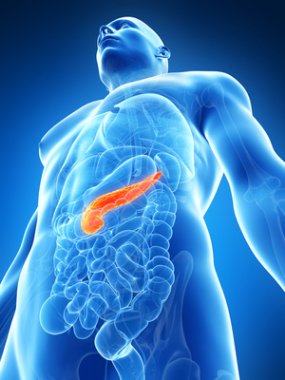 A new American study shows that chronic alcohol abuse impairs the ability of the pancreas to absorb vitamin C, and that increases the risk of infection of the pancreas (pancreatitis) and other diseases. Lack of certain B vitamins may also damage the pancreas and increase the risk of encephalitis.
A new American study shows that chronic alcohol abuse impairs the ability of the pancreas to absorb vitamin C, and that increases the risk of infection of the pancreas (pancreatitis) and other diseases. Lack of certain B vitamins may also damage the pancreas and increase the risk of encephalitis.
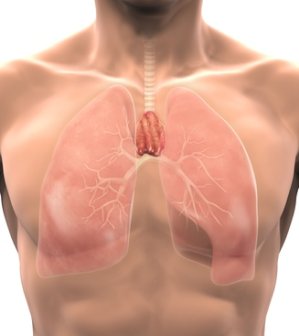 Even the earliest ageing processes are known to damage central parts of our immune system, leaving us more exposed to infection, inflammation, and cancer. However, new studies demonstrate that antioxidants such as vitamin C and selenium may repair the damage.
Even the earliest ageing processes are known to damage central parts of our immune system, leaving us more exposed to infection, inflammation, and cancer. However, new studies demonstrate that antioxidants such as vitamin C and selenium may repair the damage.
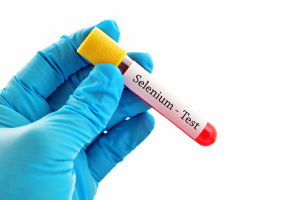 It is estimated that one billion people worldwide lack selenium. This has fatal consequences for public health because it increases the risk of virus infections, thyroid disorders, cardiovascular diseases, cancer, neurological disorders, and involuntary infertility. Adding to that problem is the fact that mercury, a known environmental toxin, throws a wrench into selenium’s different functions. In the following, we have compiled a long list of studies that look closer at the consequences of selenium deficiency and the advantage of optimizing the body’s selenium status with help from supplements.
It is estimated that one billion people worldwide lack selenium. This has fatal consequences for public health because it increases the risk of virus infections, thyroid disorders, cardiovascular diseases, cancer, neurological disorders, and involuntary infertility. Adding to that problem is the fact that mercury, a known environmental toxin, throws a wrench into selenium’s different functions. In the following, we have compiled a long list of studies that look closer at the consequences of selenium deficiency and the advantage of optimizing the body’s selenium status with help from supplements.
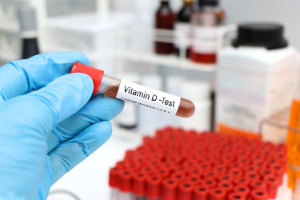 Melanoma is a type of malignant skin cancer that spreads rapidly. Being vitamin D-deficient doubles the risk of dying of the disease, according to a Spanish study that was presented at the European Academy of Dermatology and Venereology congress. It is commonly known that sunburns, which one should generally avoid, increase the risk of contracting skin cancer. But we must not forget that the summer sun is our main source of vitamin Dand at our latitude, it necessary to take a vitamin D supplement in the wintertime. People who avoid the sun or have difficulty with synthesizing vitamin D in their skin should take a supplement all year round.
Melanoma is a type of malignant skin cancer that spreads rapidly. Being vitamin D-deficient doubles the risk of dying of the disease, according to a Spanish study that was presented at the European Academy of Dermatology and Venereology congress. It is commonly known that sunburns, which one should generally avoid, increase the risk of contracting skin cancer. But we must not forget that the summer sun is our main source of vitamin Dand at our latitude, it necessary to take a vitamin D supplement in the wintertime. People who avoid the sun or have difficulty with synthesizing vitamin D in their skin should take a supplement all year round.
 Around 25 percent of adults have had canker sores, also referred to as recurrent aphthous stomatitis (RAS). The condition is characterized by painful, superficial sores, and we don’t know all that much about what causes it or how to treat it. However, according to a meta-analysis that is published in Frontiers in Nutrition, a possible cause may be low blood levels of vitamin D, a nutrient with a key role in oral health and immune defense.
Around 25 percent of adults have had canker sores, also referred to as recurrent aphthous stomatitis (RAS). The condition is characterized by painful, superficial sores, and we don’t know all that much about what causes it or how to treat it. However, according to a meta-analysis that is published in Frontiers in Nutrition, a possible cause may be low blood levels of vitamin D, a nutrient with a key role in oral health and immune defense.
 Omega-3and omega-6 fatty acids are vital for our brain function, nervous system, and immune defense but small children get too little of these two essential fatty acids. According to a Canadian study, this increases their risk of chronic inflammation and chronic diseases. The intake of omega-3 from oily fish and shellfish is particularly limited. For children who dislike seafood, a fish oil supplement is worth considering for the sake of their health and development.
Omega-3and omega-6 fatty acids are vital for our brain function, nervous system, and immune defense but small children get too little of these two essential fatty acids. According to a Canadian study, this increases their risk of chronic inflammation and chronic diseases. The intake of omega-3 from oily fish and shellfish is particularly limited. For children who dislike seafood, a fish oil supplement is worth considering for the sake of their health and development.
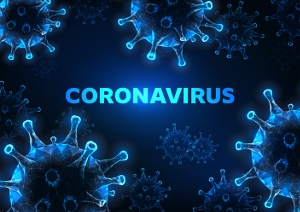 The coronavirus has spread from Wuhan in China to a number of continents, where it has caused massive fear and affected daily life and the global economy. Although most people that get the infection experience a mild course of events, the greatest fear is the potentially life-threatening complications in the respiratory system caused by oxidative stress, which have already taken thousands of human lives. Chinese scientists now call for early intravenous therapy with large doses of vitamin C to prevent oxidative stress and the life-threatening complications that follow in the wake of a derailed immune system. Many researchers also claim that higher intake of vitamin C from dietary sources or supplements help prevent by boosting and regulating the immune system in the upper respiratory tract. The same goes for vitamin D and selenium.
The coronavirus has spread from Wuhan in China to a number of continents, where it has caused massive fear and affected daily life and the global economy. Although most people that get the infection experience a mild course of events, the greatest fear is the potentially life-threatening complications in the respiratory system caused by oxidative stress, which have already taken thousands of human lives. Chinese scientists now call for early intravenous therapy with large doses of vitamin C to prevent oxidative stress and the life-threatening complications that follow in the wake of a derailed immune system. Many researchers also claim that higher intake of vitamin C from dietary sources or supplements help prevent by boosting and regulating the immune system in the upper respiratory tract. The same goes for vitamin D and selenium.
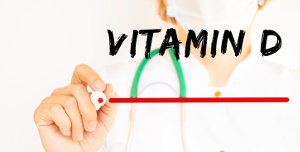 It has already been documented that the widespread problems with vitamin D deficiency increase the risk of being infected with COVID-19 and developing life-threatening complications. In a new study, a team of Turkish scientists has demonstrated that swift treatment with vitamin D can shorten the length of hospital stays plus reduce mortality risk by 50 percent. What’s more, it even has a positive effect on comorbidity. Vitamin D deficiencies are especially common during the winter period and among seniors, people of color, overweight individuals, diabetics, and other vulnerable groups. This makes the study results very relevant, especially when you consider the fact that vaccines only have a limited effect.
It has already been documented that the widespread problems with vitamin D deficiency increase the risk of being infected with COVID-19 and developing life-threatening complications. In a new study, a team of Turkish scientists has demonstrated that swift treatment with vitamin D can shorten the length of hospital stays plus reduce mortality risk by 50 percent. What’s more, it even has a positive effect on comorbidity. Vitamin D deficiencies are especially common during the winter period and among seniors, people of color, overweight individuals, diabetics, and other vulnerable groups. This makes the study results very relevant, especially when you consider the fact that vaccines only have a limited effect.
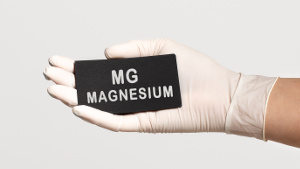 Magnesium is involved in hundreds of chemical reactions in the body, including the activation of vitamin D that we synthesize from sun exposure or take in supplement form. For that reason, magnesium is essential for the immune defense and its ability to fight COVID-19. Moreover, low magnesium levels in the body can foreshadow complications in connection with a COVID-19 infection, according to a study that is published in Nutrients. The scientists therefore say that it is relevant to measure hospitalized patients’ magnesium levels and correct any deficiencies. Many people, especially older individuals, get too little magnesium from their diets, and several types of medicine can impair the uptake and utilization of the nutrient.
Magnesium is involved in hundreds of chemical reactions in the body, including the activation of vitamin D that we synthesize from sun exposure or take in supplement form. For that reason, magnesium is essential for the immune defense and its ability to fight COVID-19. Moreover, low magnesium levels in the body can foreshadow complications in connection with a COVID-19 infection, according to a study that is published in Nutrients. The scientists therefore say that it is relevant to measure hospitalized patients’ magnesium levels and correct any deficiencies. Many people, especially older individuals, get too little magnesium from their diets, and several types of medicine can impair the uptake and utilization of the nutrient.
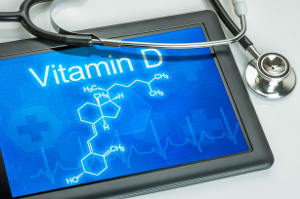 The summer sun is our most important source of vitamin D but people dark-skinned people living at northern latitudes have difficulty when it comes to producing enough of the nutrient. This makes them much more likely to become vitamin D-deficient and that can have serious health consequences, which may be life-threatening in worst case according to several studies.
The summer sun is our most important source of vitamin D but people dark-skinned people living at northern latitudes have difficulty when it comes to producing enough of the nutrient. This makes them much more likely to become vitamin D-deficient and that can have serious health consequences, which may be life-threatening in worst case according to several studies.
 Vitamin D is of vital importance to a well-functioning immune defense and it protects against virus infections. This has been confirmed by Denmark’s infection control agency, Statens Serum Institut, and researchers from Harvard University in Boston, USA. In a study, the Danish and American scientists found that having low levels of vitamin D in the blood is associated with a greater risk of severe disease outcome in patients with COVID-19.
Vitamin D is of vital importance to a well-functioning immune defense and it protects against virus infections. This has been confirmed by Denmark’s infection control agency, Statens Serum Institut, and researchers from Harvard University in Boston, USA. In a study, the Danish and American scientists found that having low levels of vitamin D in the blood is associated with a greater risk of severe disease outcome in patients with COVID-19.
 Vitamin B6 is important for energy levels, the nervous system, our mood, our immune system, our hormone balance, and a number of other functions. This vitamin is of vital importance to our physical and mental well-being but a variety of factors may lead to a deficiency. This article will provide you with information about vitamin B6 and the 11 different symptoms that a deficiency may cause.
Vitamin B6 is important for energy levels, the nervous system, our mood, our immune system, our hormone balance, and a number of other functions. This vitamin is of vital importance to our physical and mental well-being but a variety of factors may lead to a deficiency. This article will provide you with information about vitamin B6 and the 11 different symptoms that a deficiency may cause.
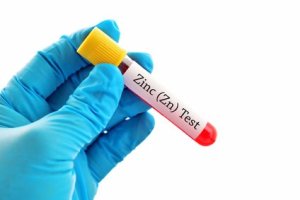 According to a new study that is published in the British Journal of Nutrition, even minor zinc deficiencies may cause poor digestion, skin problems, and fatigue - and lead to numerous other health problems in the long run. You should therefore avoid zinc shortages, and people with poor diets, vegans, vegetarians, and older people should make sure to get enough zinc.
According to a new study that is published in the British Journal of Nutrition, even minor zinc deficiencies may cause poor digestion, skin problems, and fatigue - and lead to numerous other health problems in the long run. You should therefore avoid zinc shortages, and people with poor diets, vegans, vegetarians, and older people should make sure to get enough zinc.
 The most common term for this nutrient is folic acid, whereas vitamin B9 is hardly ever used. Folic acid is the synthetic form that is found in vitamin pills, while folate and folacin are the forms of the nutrient that are found naturally in food. Folic acid is very stable and gets converted into folate in the body. The vitamin is water-soluble. Most of it gets stored in the liver, which contains around half the body's total amount of folate. The nutrient is destroyed by boiling and heating.
The most common term for this nutrient is folic acid, whereas vitamin B9 is hardly ever used. Folic acid is the synthetic form that is found in vitamin pills, while folate and folacin are the forms of the nutrient that are found naturally in food. Folic acid is very stable and gets converted into folate in the body. The vitamin is water-soluble. Most of it gets stored in the liver, which contains around half the body's total amount of folate. The nutrient is destroyed by boiling and heating.
- which is why we need enough vitamin C, selenium, and other antioxidants
 Modern man is exposed to a lot of free radicals because of factors like stress, environmental toxins, etc. Free radicals are like “internal terrorists” that contribute to atherosclerosis, diabetes, Alzheimer’s disease, cancer, and a host of other diseases. Our only protection against free radicals are antioxidants from vitamins, minerals, and plant compounds. Antioxidants work in different ways. Being deficient in a single primary antioxidant such as selenium may leave the body vulnerable to oxidative stress and disease. What most people are unaware of is that free radicals are also essential, as they are a part of our energy turnover and immune defense. The question is how do we protect ourselves the best against infections, oxidative stress, and disease? What type of antioxidant do we get from dark chocolate, green tea, coffee and red wine? How does redox therapy with vitamin C in great quantities work on cancer patients? You can read more about these topics in the following.
Modern man is exposed to a lot of free radicals because of factors like stress, environmental toxins, etc. Free radicals are like “internal terrorists” that contribute to atherosclerosis, diabetes, Alzheimer’s disease, cancer, and a host of other diseases. Our only protection against free radicals are antioxidants from vitamins, minerals, and plant compounds. Antioxidants work in different ways. Being deficient in a single primary antioxidant such as selenium may leave the body vulnerable to oxidative stress and disease. What most people are unaware of is that free radicals are also essential, as they are a part of our energy turnover and immune defense. The question is how do we protect ourselves the best against infections, oxidative stress, and disease? What type of antioxidant do we get from dark chocolate, green tea, coffee and red wine? How does redox therapy with vitamin C in great quantities work on cancer patients? You can read more about these topics in the following.
 Zinc supplements help your immune defense fight colds faster. This was seen in a Finnish meta-analysis where the majority of cold-ridden subjects who took supplements had recovered from their colds after five days, as opposed to those who did not take extra zinc. It is important to choose high-quality zinc supplements, which the body is able to absorb. Moreover, it is vital that the dose is sufficiently high during those days where the immune system actively fights the cold. High-dosed zinc supplementation is not encouraged for therapeutic use in other cases.
Zinc supplements help your immune defense fight colds faster. This was seen in a Finnish meta-analysis where the majority of cold-ridden subjects who took supplements had recovered from their colds after five days, as opposed to those who did not take extra zinc. It is important to choose high-quality zinc supplements, which the body is able to absorb. Moreover, it is vital that the dose is sufficiently high during those days where the immune system actively fights the cold. High-dosed zinc supplementation is not encouraged for therapeutic use in other cases.
-and many chronically ill people do not get the proper diagnosis or treatment
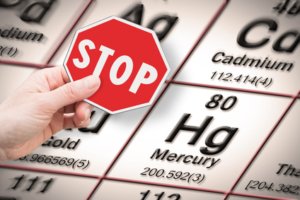 The most harmful heavy metals are mercury, cadmium, lead, nickel, and cobber, but aluminum, fluoride, iron, and calcium can also be toxic. Poisoning with heavy metals and minerals blocks other minerals such as selenium, iodine, magnesium, and zinc, all of which support numerous essential enzyme processes. At the same time, if you lack these important minerals, heavy metals are able to cause unhindered damage and increase your risk of impaired immunity, impaired fertility, autoimmune diseases, thyroid diseases, brain damage, neurological diseases, depression, hypersensitivity, etc. Chronic heavy metal toxicity is an overlooked problem, but in this article, you can read more about the subject and find out how to deal with it.
The most harmful heavy metals are mercury, cadmium, lead, nickel, and cobber, but aluminum, fluoride, iron, and calcium can also be toxic. Poisoning with heavy metals and minerals blocks other minerals such as selenium, iodine, magnesium, and zinc, all of which support numerous essential enzyme processes. At the same time, if you lack these important minerals, heavy metals are able to cause unhindered damage and increase your risk of impaired immunity, impaired fertility, autoimmune diseases, thyroid diseases, brain damage, neurological diseases, depression, hypersensitivity, etc. Chronic heavy metal toxicity is an overlooked problem, but in this article, you can read more about the subject and find out how to deal with it.
 HIV, the virus that causes AIDS, is potentially life-threatening because it attacks central cells in the immune defense. It has also been documented that HIV patients have an increased risk of lacking vitamin D. This can be because of the disease itself, the combination therapy, lack of sun exposure, or other factors. Vitamin D is important for the immune defense, the bones, our mood, and numerous other functions. According to a new article published in MedicalNews Today, it is important to measure HIV patients’ blood levels of vitamin D and possibly give them high-dosed supplements to optimize levels of the nutrient. Earlier studies point to a link between the course of an HIV infections and the body’s selenium status.
HIV, the virus that causes AIDS, is potentially life-threatening because it attacks central cells in the immune defense. It has also been documented that HIV patients have an increased risk of lacking vitamin D. This can be because of the disease itself, the combination therapy, lack of sun exposure, or other factors. Vitamin D is important for the immune defense, the bones, our mood, and numerous other functions. According to a new article published in MedicalNews Today, it is important to measure HIV patients’ blood levels of vitamin D and possibly give them high-dosed supplements to optimize levels of the nutrient. Earlier studies point to a link between the course of an HIV infections and the body’s selenium status.
 Lack of vitamin D and selenium increases your risk of catching a cold or the flu or accompanying complications. Many people resort to Echinacea, ginger, and smoothies filled to the rim with vitamin C and secondary immune compounds, but these measures can never replace the two essential nutrients, selenium and vitamin D.
Lack of vitamin D and selenium increases your risk of catching a cold or the flu or accompanying complications. Many people resort to Echinacea, ginger, and smoothies filled to the rim with vitamin C and secondary immune compounds, but these measures can never replace the two essential nutrients, selenium and vitamin D.
 Ageing is linked to uncontrolled, low-grade inflammation, also known as inflammaging, according to articles published in the journals Nature Medicine and Ageing and Disease. Although chronic inflammation is not felt directly it may set the stage for cardiovascular disease, rheumatism, Alzheimer’s disease, and cancer. Chronic inflammation may also cause virus infections like influenza and COVID-19 to become life-threatening because the immune defense suddenly overreacts and attacks healthy tissue. It is therefore vital for ageing people to protect themselves against chronic inflammation, which means getting plenty of vitamin D, selenium, coenzyme Q10, zinc, omega-3, and melatonin. These are all things that many older people often lack.
Ageing is linked to uncontrolled, low-grade inflammation, also known as inflammaging, according to articles published in the journals Nature Medicine and Ageing and Disease. Although chronic inflammation is not felt directly it may set the stage for cardiovascular disease, rheumatism, Alzheimer’s disease, and cancer. Chronic inflammation may also cause virus infections like influenza and COVID-19 to become life-threatening because the immune defense suddenly overreacts and attacks healthy tissue. It is therefore vital for ageing people to protect themselves against chronic inflammation, which means getting plenty of vitamin D, selenium, coenzyme Q10, zinc, omega-3, and melatonin. These are all things that many older people often lack.
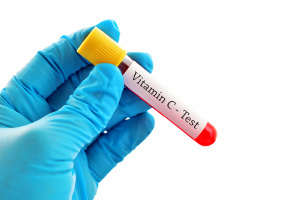 Chronic fatigue commonly follows in the wake of influenza, herpes, COVID-19, and other infections. The immune system does not function optimally, and the tiredness is caused by oxidative stress and inflammation. The condition is often accompanied by poor concentration, depression, and sleep disturbances. Oxidative stress is an imbalance between pro-inflammatory free radicals and protective antioxidants. Vitamin Chappens to be one of the most potent antioxidants, and intravenous vitamin C therapy has been shown to reduce tiredness that follows after different types of virus infections, according to a review article in the scientific journal Nutrients. Here, the scientists also write about intravenous vitamin C therapy in connection with chronic fatigue syndrome following COVID-19 infections.
Chronic fatigue commonly follows in the wake of influenza, herpes, COVID-19, and other infections. The immune system does not function optimally, and the tiredness is caused by oxidative stress and inflammation. The condition is often accompanied by poor concentration, depression, and sleep disturbances. Oxidative stress is an imbalance between pro-inflammatory free radicals and protective antioxidants. Vitamin Chappens to be one of the most potent antioxidants, and intravenous vitamin C therapy has been shown to reduce tiredness that follows after different types of virus infections, according to a review article in the scientific journal Nutrients. Here, the scientists also write about intravenous vitamin C therapy in connection with chronic fatigue syndrome following COVID-19 infections.
 Minerals are involved in countless functions of vital importance to the immune defense. That is why lack of one or several minerals can increase your risk of infections or perhaps trigger unwanted inflammation that can damage healthy tissue. In a new review article that is published in Nutrients, a group of scientists look at magnesium, selenium, zinc, iron, and copper and their role in the immune system. They also look at the fact that vegans, older people, chronically ill, pregnant women, and elite athletes often have nutrient deficiencies that call for supplementation. The agricultural soil in Europe and many other parts of the world is selenium-depleted, which makes it challenging to get enough selenium from our diets. But it is also important not to overdose on minerals. In this article, you can read more about how to optimize your nutrient intake for your immune health.
Minerals are involved in countless functions of vital importance to the immune defense. That is why lack of one or several minerals can increase your risk of infections or perhaps trigger unwanted inflammation that can damage healthy tissue. In a new review article that is published in Nutrients, a group of scientists look at magnesium, selenium, zinc, iron, and copper and their role in the immune system. They also look at the fact that vegans, older people, chronically ill, pregnant women, and elite athletes often have nutrient deficiencies that call for supplementation. The agricultural soil in Europe and many other parts of the world is selenium-depleted, which makes it challenging to get enough selenium from our diets. But it is also important not to overdose on minerals. In this article, you can read more about how to optimize your nutrient intake for your immune health.
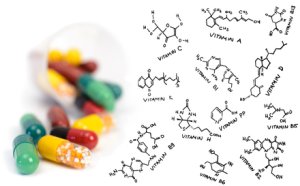 Many people take a multivitamin this time of year. However, even if the manufacturers really squeeze together the ingredients it is impossible to put enough vitamins and minerals in one pill to cover our actual needs. In fact, the manufacturing process determines if we are able to absorb the different nutrients in the first place, and that is important for them to work properly in the body. Therefore, it is vital that you choose a supplement that has good quality, and you must make sure to focus on the vitamins, minerals, and essential fatty acids that we humans typically tend to lack.
Many people take a multivitamin this time of year. However, even if the manufacturers really squeeze together the ingredients it is impossible to put enough vitamins and minerals in one pill to cover our actual needs. In fact, the manufacturing process determines if we are able to absorb the different nutrients in the first place, and that is important for them to work properly in the body. Therefore, it is vital that you choose a supplement that has good quality, and you must make sure to focus on the vitamins, minerals, and essential fatty acids that we humans typically tend to lack.
- and that is really bad for your health
 Vitamin D comes in different forms that all need magnesium to be activated in order for the vitamin to be able to benefit all the cells and tissues in the body. Unfortunately, many people lack magnesium, and that makes vitamin D ineffective. Vitamin D also increases the uptake of calcium, but with too little magnesium in the organism, the risk of atherosclerosis increases, as does the risk of osteoporosis, impaired immune resistance, and metabolic syndrome (an early stage of type 2 diabetes.) All of this was observed in a study that is published in The Journal of the American Osteopathic Association.
Vitamin D comes in different forms that all need magnesium to be activated in order for the vitamin to be able to benefit all the cells and tissues in the body. Unfortunately, many people lack magnesium, and that makes vitamin D ineffective. Vitamin D also increases the uptake of calcium, but with too little magnesium in the organism, the risk of atherosclerosis increases, as does the risk of osteoporosis, impaired immune resistance, and metabolic syndrome (an early stage of type 2 diabetes.) All of this was observed in a study that is published in The Journal of the American Osteopathic Association.
– and could even make them more dangerous
 Selenium is of vital importance to a strong immune defense. Still, selenium deficiency is a common problem and it increases the risk of viral infections such as influenza and the coronavirus from China, which is feared to turn into a global pandemic. It is a problem that selenium deficiency in infected animals and humans causes the virus to mutate and become more aggressive. Because of selenium’s important role as a powerful antioxidant, being deficient of this micronutrient may leave the body vulnerable to oxidative stress, which can cause tissue damage and complicate the virus infection. It is therefore important to get enough selenium at all times, as it also increases our resistance towards other viral infections such as herpes, HIV, and hepatitis, according to an article published in Nutrients.
Selenium is of vital importance to a strong immune defense. Still, selenium deficiency is a common problem and it increases the risk of viral infections such as influenza and the coronavirus from China, which is feared to turn into a global pandemic. It is a problem that selenium deficiency in infected animals and humans causes the virus to mutate and become more aggressive. Because of selenium’s important role as a powerful antioxidant, being deficient of this micronutrient may leave the body vulnerable to oxidative stress, which can cause tissue damage and complicate the virus infection. It is therefore important to get enough selenium at all times, as it also increases our resistance towards other viral infections such as herpes, HIV, and hepatitis, according to an article published in Nutrients.
 Nothing beats a good night’s sleep. Still, sleep disturbances are widespread, and surprisingly many people struggle through the day, trying to survive on far too much coffee and other stimulants – and they cannot do anything about the problem. It turns out that many vegetarians, users of birth control pills, older people, and diabetics suffer from sleep problems because they lack vitamin B12. A vitamin B12 deficiency may also affect the nervous system and memory so it is vital to get enough of this nutrient.
Nothing beats a good night’s sleep. Still, sleep disturbances are widespread, and surprisingly many people struggle through the day, trying to survive on far too much coffee and other stimulants – and they cannot do anything about the problem. It turns out that many vegetarians, users of birth control pills, older people, and diabetics suffer from sleep problems because they lack vitamin B12. A vitamin B12 deficiency may also affect the nervous system and memory so it is vital to get enough of this nutrient.
- for longer periods
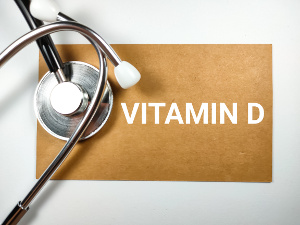 Vitamin D’s role in maintaining proper health is well documented. Still, many older people lack the nutrient and that increases their risk of bone fractures, blood poisoning, and disease complications that can eventually lead to hospitalization. Also, they risk prolonged hospitalization according to a new Irish study published in the scientific journal Nutrients. The scientists recommend giving vitamin D supplements to seniors to increase their blood levels of vitamin D. Other studies even suggest that this can protect against COVID-19, as low vitamin D status is associated with an increased risk of being hospitalized with the disease.
Vitamin D’s role in maintaining proper health is well documented. Still, many older people lack the nutrient and that increases their risk of bone fractures, blood poisoning, and disease complications that can eventually lead to hospitalization. Also, they risk prolonged hospitalization according to a new Irish study published in the scientific journal Nutrients. The scientists recommend giving vitamin D supplements to seniors to increase their blood levels of vitamin D. Other studies even suggest that this can protect against COVID-19, as low vitamin D status is associated with an increased risk of being hospitalized with the disease.
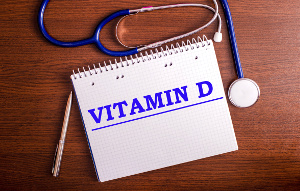 Vitamin D plays an overlooked role in the immune defense. Being deficient of the nutrient increases your risk of bacterial pneumonia by up to 60 percent, according to a large Danish study of 116,000 participants that was carried out by scientists from Herlev Hospital, Gentofte Hospital, and the University of Copenhagen.
Vitamin D plays an overlooked role in the immune defense. Being deficient of the nutrient increases your risk of bacterial pneumonia by up to 60 percent, according to a large Danish study of 116,000 participants that was carried out by scientists from Herlev Hospital, Gentofte Hospital, and the University of Copenhagen.
Because many older people, cancer patients, and other chronically ill individuals are at increased risk of respiratory infections and because bacterial pneumonia can be potentially lethal, the scientists see a huge potential in using vitamin D supplements to prevent the disease.
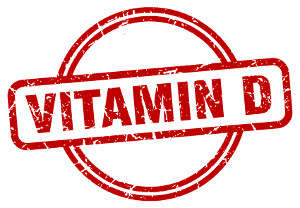 Hashimoto’s disease (Hashimoto’s thyroiditis) is an overlooked scourge that leads to hypothyroidism and is particularly widespread among women. Postpartum thyroiditis that also slows down your metabolism follows in the wake of pregnancy. Graves’ disease where the metabolism speeds up (hyperthyroidism) is less common. These three thyroid disorders belong to the group of autoimmune disorders where the immune defense attacks the body’s tissues, and it appears that lack of vitamin D increases the risk, as it controls the immune defense in a number of ways. According to a new review article that is published in Nutrients, taking larger quantities of vitamin D may have a positive impact on these thyroid disorders.
Hashimoto’s disease (Hashimoto’s thyroiditis) is an overlooked scourge that leads to hypothyroidism and is particularly widespread among women. Postpartum thyroiditis that also slows down your metabolism follows in the wake of pregnancy. Graves’ disease where the metabolism speeds up (hyperthyroidism) is less common. These three thyroid disorders belong to the group of autoimmune disorders where the immune defense attacks the body’s tissues, and it appears that lack of vitamin D increases the risk, as it controls the immune defense in a number of ways. According to a new review article that is published in Nutrients, taking larger quantities of vitamin D may have a positive impact on these thyroid disorders.
 It is hardly a coincidence that sore throats, colds, flus, and related complications such as sinus infections and pneumonia typically circulate during the winter period. They are primarily a result of having low vitamin Dlevels. During the winter, the sun sits too low in the sky to enable vitamin D synthesis in our skin, and we only have a limited amount of the nutrient stored in the liver. Good hand hygiene, warm soup, garlic, echinacea and other immune-boosting herbs alone will not deal with the problem, as they can never compensate for our lack of essential vitamin D, which the white blood cells of our immune system need in order to silently kill of virus. But how much vitamin D do we need, is it possible to get too much, and which mineral is necessary for activating the vitamin?
It is hardly a coincidence that sore throats, colds, flus, and related complications such as sinus infections and pneumonia typically circulate during the winter period. They are primarily a result of having low vitamin Dlevels. During the winter, the sun sits too low in the sky to enable vitamin D synthesis in our skin, and we only have a limited amount of the nutrient stored in the liver. Good hand hygiene, warm soup, garlic, echinacea and other immune-boosting herbs alone will not deal with the problem, as they can never compensate for our lack of essential vitamin D, which the white blood cells of our immune system need in order to silently kill of virus. But how much vitamin D do we need, is it possible to get too much, and which mineral is necessary for activating the vitamin?
 Levels of magnesium in the blood are determining for the immune system’s ability to attack pathogens and cancer cells, according to a new study from the University of Basel and the University Hospital Basel. The scientists have discovered that the T cells of the immune system need magnesium in order to carry out proper attacks. According to the scientists, these results are extremely important because magnesium has a potential role in new immunotherapies targeted at cancer patients. It is generally important to get plenty of magnesium because this nutrient is vital for the body’s calcium distribution and for supporting hundreds of enzyme processes.
Levels of magnesium in the blood are determining for the immune system’s ability to attack pathogens and cancer cells, according to a new study from the University of Basel and the University Hospital Basel. The scientists have discovered that the T cells of the immune system need magnesium in order to carry out proper attacks. According to the scientists, these results are extremely important because magnesium has a potential role in new immunotherapies targeted at cancer patients. It is generally important to get plenty of magnesium because this nutrient is vital for the body’s calcium distribution and for supporting hundreds of enzyme processes.
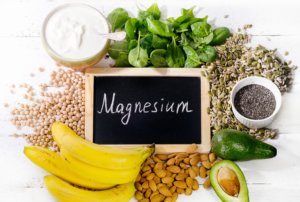 We need plenty of vitamin D for our bones and immune defense, for preventing cancer and so on, but if we lack magnesium, vitamin D does not work as expected. This is because magnesium is needed for activating vitamin D and enabling it to benefit the body’s cells and tissues. Magnesium also regulates blood levels of vitamin D, more specifically by increasing them if they are too low and lowering them if they are too high. This was demonstrated in a recent study from Vanderbilt University, the United States. The scientists call this highly important information, as there has been conflicting results from studies that compared blood levels of vitamin D in relation to colon cancer and various other diseases. Because magnesium deficiency is a widespread and overlooked problem, there is reason to believe that many people have difficulty with regulating levels of vitamin D in their blood. Also, they risk that their vitamin D does not have the desired effect in terms of preventing a host of different diseases.
We need plenty of vitamin D for our bones and immune defense, for preventing cancer and so on, but if we lack magnesium, vitamin D does not work as expected. This is because magnesium is needed for activating vitamin D and enabling it to benefit the body’s cells and tissues. Magnesium also regulates blood levels of vitamin D, more specifically by increasing them if they are too low and lowering them if they are too high. This was demonstrated in a recent study from Vanderbilt University, the United States. The scientists call this highly important information, as there has been conflicting results from studies that compared blood levels of vitamin D in relation to colon cancer and various other diseases. Because magnesium deficiency is a widespread and overlooked problem, there is reason to believe that many people have difficulty with regulating levels of vitamin D in their blood. Also, they risk that their vitamin D does not have the desired effect in terms of preventing a host of different diseases.
 Magnesium is required for a well-functioning immune defense and for controlling inflammatory processes that are vital to our health. Magnesium also appears to protect against COVID-19 and other infections and the development of cancer, according to a review article published in Journal of Health, Population, and Nutrition. Our modern, refined diet, stress, ageing, stimulant abuse, and different types of medicine also contribute to the widespread problems with magnesium deficiency.
Magnesium is required for a well-functioning immune defense and for controlling inflammatory processes that are vital to our health. Magnesium also appears to protect against COVID-19 and other infections and the development of cancer, according to a review article published in Journal of Health, Population, and Nutrition. Our modern, refined diet, stress, ageing, stimulant abuse, and different types of medicine also contribute to the widespread problems with magnesium deficiency.
 Nowadays, fruit, potatoes, and vegetables in general contain very little vitamin C, and the majority of people fail to eat the recommended amount of these foods, in the first place. Unhealthy diets and lack of vitamin C increase the risk of colds, influenza, and other infections, simply because the immune system consumes large amounts of vitamin C in connection with the first explosive attacks that prevent virus from causing an infection. Vitamin C also has an important role in battling infections and preventing them from dragging on and leading to complications such as bronchitis or pneumonia.
Nowadays, fruit, potatoes, and vegetables in general contain very little vitamin C, and the majority of people fail to eat the recommended amount of these foods, in the first place. Unhealthy diets and lack of vitamin C increase the risk of colds, influenza, and other infections, simply because the immune system consumes large amounts of vitamin C in connection with the first explosive attacks that prevent virus from causing an infection. Vitamin C also has an important role in battling infections and preventing them from dragging on and leading to complications such as bronchitis or pneumonia.
 More than 25 percent of people older than 65 years have low levels of vitamin D in their blood. Deficiencies in vitamin B12, folic acid, and iron are also common. This is the conclusion of a large study that was conducted by scientists from Helmholtz Zentrum in Munich, Germany. The widespread lack of vitamins and minerals among older people is critical, especially because this population group is increasing. The lack of essential nutrients affects the calcium uptake, immune defense, and nervous system among other things, leaving older people increasingly vulnerable to osteoporosis, influenza, dementia, and a host of other diseases that impair quality of life and burden the entire public health sector.
More than 25 percent of people older than 65 years have low levels of vitamin D in their blood. Deficiencies in vitamin B12, folic acid, and iron are also common. This is the conclusion of a large study that was conducted by scientists from Helmholtz Zentrum in Munich, Germany. The widespread lack of vitamins and minerals among older people is critical, especially because this population group is increasing. The lack of essential nutrients affects the calcium uptake, immune defense, and nervous system among other things, leaving older people increasingly vulnerable to osteoporosis, influenza, dementia, and a host of other diseases that impair quality of life and burden the entire public health sector.
- this may improve vegetarian diets in the future
 We need vitamin B12 for blood formation, for the nervous system, and for our cognitive skills. Vitamin B12 is almost primarily found in animal sources. However, researchers from the University of Kent in England have just made an important discovery. They have observed how some plants such as cress can absorb the nutrient when cultivated in a certain way. With this knowledge, we can make vegetarian and vegan diets healthier and more complete in the future. Many vegetarians and vegans appear to be doing just fine on their green diets, but many are unaware that a vitamin B12 deficiency can be insidious, and it may take years before they experience obvious symptoms such as anemia, tiredness, poor memory, and other signs of a nervous system that is out of balance. It is therefore a good idea under all circumstances to take a vitamin B12 supplement, until some of these vitamin B12-containing vegetable solutions are available on the market.
We need vitamin B12 for blood formation, for the nervous system, and for our cognitive skills. Vitamin B12 is almost primarily found in animal sources. However, researchers from the University of Kent in England have just made an important discovery. They have observed how some plants such as cress can absorb the nutrient when cultivated in a certain way. With this knowledge, we can make vegetarian and vegan diets healthier and more complete in the future. Many vegetarians and vegans appear to be doing just fine on their green diets, but many are unaware that a vitamin B12 deficiency can be insidious, and it may take years before they experience obvious symptoms such as anemia, tiredness, poor memory, and other signs of a nervous system that is out of balance. It is therefore a good idea under all circumstances to take a vitamin B12 supplement, until some of these vitamin B12-containing vegetable solutions are available on the market.
 Older people can easily become deficient of vitamins and minerals, which can weaken their immune system and make them more prone to infections and prolonged periods with disease. On the other hand, older people who take a multivitamin and mineral supplement with zinc and large quantities of vitamin C experience fewer days with disease and have less severe symptoms, according to a placebo-controlled study from Oregon State University. But many multivitamin supplements do not contain enough vitamin D and it is very important for older people to get enough of this nutrient.
Older people can easily become deficient of vitamins and minerals, which can weaken their immune system and make them more prone to infections and prolonged periods with disease. On the other hand, older people who take a multivitamin and mineral supplement with zinc and large quantities of vitamin C experience fewer days with disease and have less severe symptoms, according to a placebo-controlled study from Oregon State University. But many multivitamin supplements do not contain enough vitamin D and it is very important for older people to get enough of this nutrient.
- even in the case of COVID-19
 Vitamin D is important for a well-functioning immune defense and a number of other functions. A team of scientists from Purdue University and National Institutes of Health in the United States has recently uncovered mechanisms that enable vitamin D to reduce hyperinflammation in severe COVID-19 cases. The scientists refer to a particularly active vitamin D metabolite that is formed in immune cells, in the lungs, and various other places. It is important to have adequate levels of vitamin D at all times, and it is equally vital for the body to be able to activate vitamin D, a process that requires the presence of magnesium.
Vitamin D is important for a well-functioning immune defense and a number of other functions. A team of scientists from Purdue University and National Institutes of Health in the United States has recently uncovered mechanisms that enable vitamin D to reduce hyperinflammation in severe COVID-19 cases. The scientists refer to a particularly active vitamin D metabolite that is formed in immune cells, in the lungs, and various other places. It is important to have adequate levels of vitamin D at all times, and it is equally vital for the body to be able to activate vitamin D, a process that requires the presence of magnesium.
 Periodontal disease affects most people at some stage in life. However, according to a recent study that is published in Contemporary Clinical Dentistry, supplemental use of Q10 and tea tree oil may have potential benefits.
Periodontal disease affects most people at some stage in life. However, according to a recent study that is published in Contemporary Clinical Dentistry, supplemental use of Q10 and tea tree oil may have potential benefits.
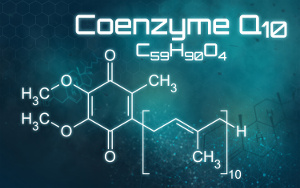 According to WHO, sepsis is the third-most common cause of death, following cardiovascular disease and death. Sepsis is a result of the immune defense overreacting to an infection in the bloodstream. According to a new Slovakian study published in Bratislava Medical Journal, if you start supplementing with Q10 early in the treatment phase, it may reduce the symptoms and improve the chances of survival. Read more about another nutrient that contributes to the prevention of sepsis.
According to WHO, sepsis is the third-most common cause of death, following cardiovascular disease and death. Sepsis is a result of the immune defense overreacting to an infection in the bloodstream. According to a new Slovakian study published in Bratislava Medical Journal, if you start supplementing with Q10 early in the treatment phase, it may reduce the symptoms and improve the chances of survival. Read more about another nutrient that contributes to the prevention of sepsis.
 More and more people boost their immune with help from Echinacea, ginger, smoothies, and juices packed with vitamin C, antioxidants and secondary immune-strengthening compounds. Nonetheless, none of these otherwise useful strategies can compensate for the widespread lack of vitamin D that is the underlying reason why so many of us contract virus infections during the winter period.
More and more people boost their immune with help from Echinacea, ginger, smoothies, and juices packed with vitamin C, antioxidants and secondary immune-strengthening compounds. Nonetheless, none of these otherwise useful strategies can compensate for the widespread lack of vitamin D that is the underlying reason why so many of us contract virus infections during the winter period.
In a new scientific study Danish researchers from Copenhagen University have demonstrated that methylated selenium compounds can regulate the body's immune system enabling it to better fight certain cancers. These selenium compounds are found in certain foods such as garlic and broccoli, but also in selenium yeast.
 Selenium is crucial for your thyroid function, immune system, cardiovascular system, and even for preventing cancer. Fish and shellfish are among the best selenium sources, but even 200 grams of fish and shellfish five days a week won’t do the trick, according to a Danish selenium study. What makes it even more difficult to obtain optimal amounts of this nutrient is that the agricultural soil in large parts of Europe is stripped of vital nutrients like selenium. Margaret P. Rayman, one of Europe’s leading experts on selenium, says that there is a direct link between the decreasing selenium intake and the increasing rate of cancers, rheumatism, infertility, and numerous other health problems. The question is, how do we humans get enough selenium?
Selenium is crucial for your thyroid function, immune system, cardiovascular system, and even for preventing cancer. Fish and shellfish are among the best selenium sources, but even 200 grams of fish and shellfish five days a week won’t do the trick, according to a Danish selenium study. What makes it even more difficult to obtain optimal amounts of this nutrient is that the agricultural soil in large parts of Europe is stripped of vital nutrients like selenium. Margaret P. Rayman, one of Europe’s leading experts on selenium, says that there is a direct link between the decreasing selenium intake and the increasing rate of cancers, rheumatism, infertility, and numerous other health problems. The question is, how do we humans get enough selenium?
 During the winter period, many of us have runny noses and some may end up in bed with a bout of flu. Now is the time to prime your immune system by getting all those vitamins and minerals that your diet is not always able to provide you. That way you can ward off germs and avoid unnecessary sick days. But what effect does vitamin C, vitamin D, selenium, and zinc have on the immune system’s different “troops”, and how much do we need?
During the winter period, many of us have runny noses and some may end up in bed with a bout of flu. Now is the time to prime your immune system by getting all those vitamins and minerals that your diet is not always able to provide you. That way you can ward off germs and avoid unnecessary sick days. But what effect does vitamin C, vitamin D, selenium, and zinc have on the immune system’s different “troops”, and how much do we need?
 Hormonal imbalances have broad implications and increase the risk of chronic fatigue, overweight, impaired fertility, dry mucosa, hot flushes, slow metabolism, breast cancer, and many other problems. Lack of essential nutrients contributes to such disruptions of the sensitive hormone system. This is also the case with hormone-disrupting compounds.
Hormonal imbalances have broad implications and increase the risk of chronic fatigue, overweight, impaired fertility, dry mucosa, hot flushes, slow metabolism, breast cancer, and many other problems. Lack of essential nutrients contributes to such disruptions of the sensitive hormone system. This is also the case with hormone-disrupting compounds.
 We are constantly being warned about sun exposure and skin cancer. Still, it is important that we get plenty of vitamin D from sunshine - as long as we avoid getting burned. Vitamin D prevents and cures many diseases, and it may not only be the Mediterranean diet alone but the increased sun exposure and higher vitamin D levels that help people in Southern Europe avoid cardiovascular disease and other ailments.
We are constantly being warned about sun exposure and skin cancer. Still, it is important that we get plenty of vitamin D from sunshine - as long as we avoid getting burned. Vitamin D prevents and cures many diseases, and it may not only be the Mediterranean diet alone but the increased sun exposure and higher vitamin D levels that help people in Southern Europe avoid cardiovascular disease and other ailments.
 During the winter period, many people catch a cold or are bed-ridden with a bout of the flu. They may consider this to be perfectly natural, but it is actually a sign of a weakened immune defense, and that makes them susceptible to contamination. What matters is to make sure to get plenty of vitamin D, vitamin C, selenium, and zinc, all of which are nutrients that have different functions in the immune system. Some nutrients are also needed in larger quantities to tackle a beginning infection, and it is important to act quickly in order to nip the infection in the bud.
During the winter period, many people catch a cold or are bed-ridden with a bout of the flu. They may consider this to be perfectly natural, but it is actually a sign of a weakened immune defense, and that makes them susceptible to contamination. What matters is to make sure to get plenty of vitamin D, vitamin C, selenium, and zinc, all of which are nutrients that have different functions in the immune system. Some nutrients are also needed in larger quantities to tackle a beginning infection, and it is important to act quickly in order to nip the infection in the bud.
In fact, it is vital for us to be nutritionally bolstered during the winter period, where otherwise harmless virus infections can lead to complications such as herpes, bronchitis, and pneumonia, if the immune system is unable to work full throttle.
 Undernourishment typically affects the elderly, those with diseases, addicts, and people with eating disorders. The condition increases the risk of serious diseases and repeated hospitalizations and is an enormous economic burden to society. Many undernourished people suffer from loss of appetite, a problem that can often be stimulated with improved diets and supplements of B vitamins.
Undernourishment typically affects the elderly, those with diseases, addicts, and people with eating disorders. The condition increases the risk of serious diseases and repeated hospitalizations and is an enormous economic burden to society. Many undernourished people suffer from loss of appetite, a problem that can often be stimulated with improved diets and supplements of B vitamins.
 If you are vegetarian or vegan you need keen insight in order to know how to get enough protein, vitamins, minerals, fatty acids, and certain amino acids. Lack of essential nutrients can cause anemia and fatigue but may also increase your risk of serious diseases.
If you are vegetarian or vegan you need keen insight in order to know how to get enough protein, vitamins, minerals, fatty acids, and certain amino acids. Lack of essential nutrients can cause anemia and fatigue but may also increase your risk of serious diseases.
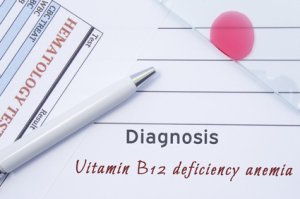 It came as good news for vegetarians, vegans and sclerosis sufferers when Danish health authorities allowed strong vitamin B12 preparations on the market some years ago. It was also positive that the active methylated form of vitamin B12 was added to the list of approved ingredients.
It came as good news for vegetarians, vegans and sclerosis sufferers when Danish health authorities allowed strong vitamin B12 preparations on the market some years ago. It was also positive that the active methylated form of vitamin B12 was added to the list of approved ingredients.
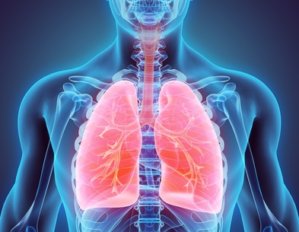 Tuberculosis is one of the most common diseases in the world and costs millions of lives, especially in the underdeveloped countries. Tuberculosis typically goes hand in hand with malnutrition, and now a group of scientists from Dublin in Ireland has found that vitamin A helps the lungs’ immune defense fight the disease. Their research is published in the esteemed Journal of Respiratory Cell and Molecular Biology.
Tuberculosis is one of the most common diseases in the world and costs millions of lives, especially in the underdeveloped countries. Tuberculosis typically goes hand in hand with malnutrition, and now a group of scientists from Dublin in Ireland has found that vitamin A helps the lungs’ immune defense fight the disease. Their research is published in the esteemed Journal of Respiratory Cell and Molecular Biology.
 Vitamin B12 is a common term for a group of chemically related substances that all have vitamin activity. They are also known as cobalamins. The biosynthesis of the basic structure is handled by bacteria that are found many places in nature. The uptake of vitamin B12 from food requires the presence of the protein intrinsic factor that is formed in the gastric mucosa. Intrinsic factor binds to vitamin B12 and transports it into the body from the small intestine. Coli bacteria in the colon also produce vitamin B12 that is taken up by the body. Vitamin B12 is stored in the liver for up to several months at a time, and we humans are also able to reuse vitamin B12 that has been absorbed from the intestine. It is generally more difficult for the body to absorb vitamin B12 compared with other vitamins, and our ability to take up the nutrient decreases as we grow older. The synthetic basic form of vitamin B12 is used in nutritional supplements and also as a food additive. The dosages are typically rather large in order to ensure sufficient uptake of the nutrient.
Vitamin B12 is a common term for a group of chemically related substances that all have vitamin activity. They are also known as cobalamins. The biosynthesis of the basic structure is handled by bacteria that are found many places in nature. The uptake of vitamin B12 from food requires the presence of the protein intrinsic factor that is formed in the gastric mucosa. Intrinsic factor binds to vitamin B12 and transports it into the body from the small intestine. Coli bacteria in the colon also produce vitamin B12 that is taken up by the body. Vitamin B12 is stored in the liver for up to several months at a time, and we humans are also able to reuse vitamin B12 that has been absorbed from the intestine. It is generally more difficult for the body to absorb vitamin B12 compared with other vitamins, and our ability to take up the nutrient decreases as we grow older. The synthetic basic form of vitamin B12 is used in nutritional supplements and also as a food additive. The dosages are typically rather large in order to ensure sufficient uptake of the nutrient.
 Intensive care units in hospitals offer treatment for critically ill patients, who are monitored and receive specialist care around the clock. It goes without saying that this type of medical attention is associated with both suffering and comes with a huge price tag. A whole new meta-analysis has shown that vitamin C supplementation is an inexpensive way to shorten the duration of intensive care hospitalization by eight percent. The reason is that vitamin C has a host of important functions in the body, including an ability to speed up the healing process.
Intensive care units in hospitals offer treatment for critically ill patients, who are monitored and receive specialist care around the clock. It goes without saying that this type of medical attention is associated with both suffering and comes with a huge price tag. A whole new meta-analysis has shown that vitamin C supplementation is an inexpensive way to shorten the duration of intensive care hospitalization by eight percent. The reason is that vitamin C has a host of important functions in the body, including an ability to speed up the healing process.
 There are several kinds of vitamin D with the two most important being:
There are several kinds of vitamin D with the two most important being:
- D2, ergocalciferol, that is found naturally in the plant kingdom.
- Vitamin D3, cholecalciferol, that is found naturally in the animal kingdom.
Humans synthesise vitamin D (cholecalciferol) from sunlight (UV-B rays) and a cholesterol compound in the skin, which is converted to active vitamins by means of processes in the liver and kidneys. We humans are only able to synthesise vitamin D during the summer season when the sun is high in the sky. Excess amounts of the nutrient are stored in the liver for future use. Light skin produces substantially larger amounts of vitamin D than dark skin. In contrast, dark skin protects against vitamin D overproduction. As we grow older, our vitamin D production decreases. Vitamin D is also called a provitamin or hormone, simply because we are easily able to make it ourselves, and all cells in the body have vitamin D receptors.
Vitamin D is fat-soluble and is stored in the body's fat tissue when ingested in large amounts. Vitamin D is destroyed by light and heat from cooking.
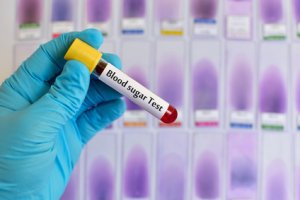 More vitamin D may contribute to better blood sugar regulation in type 2 diabetes. Eggs are a good source of vitamin D, but in the winter period it may be a good idea to take a high-dosed supplement.
More vitamin D may contribute to better blood sugar regulation in type 2 diabetes. Eggs are a good source of vitamin D, but in the winter period it may be a good idea to take a high-dosed supplement.
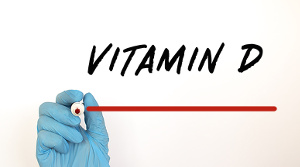 Vitamin D is essential for the immune defense but many of us are deficient of the nutrient during the dark winter period. The Danish Veterinary and Food Administration therefore recommends for everyone to take a vitamin D supplement in the winter months and that vulnerable population groups supplement all year round. Many people are unaware that being vitamin D-deficient contributes to new waves of COVID-19 and other types of viruses while increasing the risk of infections becoming complicated and life-threatening. This was demonstrated in multiple studies that have been published over the past 18 months. Leading scientists call for immediate action in terms of optimizing vitamin D levels in the population to help fight COVID-19 and other virus infections, simply because vaccines only have limited effect.
Vitamin D is essential for the immune defense but many of us are deficient of the nutrient during the dark winter period. The Danish Veterinary and Food Administration therefore recommends for everyone to take a vitamin D supplement in the winter months and that vulnerable population groups supplement all year round. Many people are unaware that being vitamin D-deficient contributes to new waves of COVID-19 and other types of viruses while increasing the risk of infections becoming complicated and life-threatening. This was demonstrated in multiple studies that have been published over the past 18 months. Leading scientists call for immediate action in terms of optimizing vitamin D levels in the population to help fight COVID-19 and other virus infections, simply because vaccines only have limited effect.
 According to a study that was presented to a group of endocrinologists at an Edinburgh conference, supplements of vitamin Dmay improve sports performance and reduce the risk of cardiovascular disease. One of the things vitamin D does is to block the stress hormone cortisol that makes your blood pressure go up. The problem is that many people lack vitamin D, not only in the winter time but even during the summer period.
According to a study that was presented to a group of endocrinologists at an Edinburgh conference, supplements of vitamin Dmay improve sports performance and reduce the risk of cardiovascular disease. One of the things vitamin D does is to block the stress hormone cortisol that makes your blood pressure go up. The problem is that many people lack vitamin D, not only in the winter time but even during the summer period.
- which is involved in asthma, rheumatoid arthritis and most chronic diseases
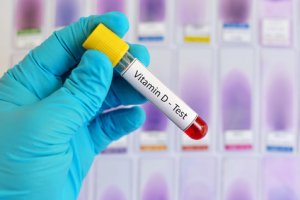 This time of year, many people suffer from asthma, aching joints, or an exacerbation of other chronic diseases that involve inflammation. This is often because they lack vitamin D, as the sun sits too low in the sky for us humans to be able to synthesize the vitamin. Also, the diet and normal vitamin pills only provide minimal amounts vitamin D. It has been known for a long time that vitamin D counteracts inflammation. Now, a large systematic study is planned to investigate how supplementing with large quantities of vitamin D can affect the molecular mechanisms that counteract inflammation.
This time of year, many people suffer from asthma, aching joints, or an exacerbation of other chronic diseases that involve inflammation. This is often because they lack vitamin D, as the sun sits too low in the sky for us humans to be able to synthesize the vitamin. Also, the diet and normal vitamin pills only provide minimal amounts vitamin D. It has been known for a long time that vitamin D counteracts inflammation. Now, a large systematic study is planned to investigate how supplementing with large quantities of vitamin D can affect the molecular mechanisms that counteract inflammation.
 It is hardly a coincidence that so many of us contract virus infections in the course of the winter. It is because we lack vitamin D, which we are unable to synthesize when the sun sits too low in the sky. Danish scientists have discovered how vitamin D activates the immune system, and a comprehensive meta-analysis shows how vitamin D supplements can prevent colds, flus, and related complications.
It is hardly a coincidence that so many of us contract virus infections in the course of the winter. It is because we lack vitamin D, which we are unable to synthesize when the sun sits too low in the sky. Danish scientists have discovered how vitamin D activates the immune system, and a comprehensive meta-analysis shows how vitamin D supplements can prevent colds, flus, and related complications.
- and may save the lives of many weak and older people
 Supplementing with high doses of vitamin D may lower the rate of acute airway infections by up to 40 per cent. This simple trick may have the potential to save millions of lives, as many older people, cancer patients and others people with impaired resistance die of pneumonia.
Supplementing with high doses of vitamin D may lower the rate of acute airway infections by up to 40 per cent. This simple trick may have the potential to save millions of lives, as many older people, cancer patients and others people with impaired resistance die of pneumonia.
- that cause many sick days and even deaths
 Vitamin D supplements prevent colds, influenza, and intercurrent complications. This was seen in a large meta-analysis emphasizing that vitamin D is not only important for bone health but also for the immune system, which may require larger quantities. Because many old people or weakened individuals die of pneumonia, supplementing with vitamin D may potentially save millions of lives.
Vitamin D supplements prevent colds, influenza, and intercurrent complications. This was seen in a large meta-analysis emphasizing that vitamin D is not only important for bone health but also for the immune system, which may require larger quantities. Because many old people or weakened individuals die of pneumonia, supplementing with vitamin D may potentially save millions of lives.
- which vitamin D2 does not have
 Vitamin D2 occurs naturally in foods from the plant kingdom while vitamin D3 comes from animal sources. It is also vitamin D3 that we synthesize in our skin in response to sun exposure. Scientists from the Universities of Surrey and Brighton in Great Britain have now discovered that the two types of vitamin D have entirely different effects. They therefore sow doubts about vitamin D2’s role in human health, whereas vitamin D3 is known for its vital role in helping the immune system in its fight against infections such as COVID-19. Most cells in the body have vitamin D receptors, and the nutrient is also important for cancer prevention, the nervous system, our mood, and a number of other functions. Vitamin D3 from food, supplements, or sunshine must be activated in the body before it can be utilized.
Vitamin D2 occurs naturally in foods from the plant kingdom while vitamin D3 comes from animal sources. It is also vitamin D3 that we synthesize in our skin in response to sun exposure. Scientists from the Universities of Surrey and Brighton in Great Britain have now discovered that the two types of vitamin D have entirely different effects. They therefore sow doubts about vitamin D2’s role in human health, whereas vitamin D3 is known for its vital role in helping the immune system in its fight against infections such as COVID-19. Most cells in the body have vitamin D receptors, and the nutrient is also important for cancer prevention, the nervous system, our mood, and a number of other functions. Vitamin D3 from food, supplements, or sunshine must be activated in the body before it can be utilized.
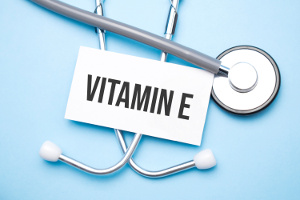 Immunotherapy has a special potential when used to treat cancer, which is because this particular type of therapy inhibits special molecules that block the body’s own defense mechanism against cancer cells. A team of scientists from Texas has discovered that vitamin E inhibits a particular molecule, thereby boosting the immunotherapy’s ability to stimulate important white blood cells. The scientists made this discovery by analyzing clinical data and in-depth laboratory studies. Vitamin E may play a future role in the prevention and treatment of cancer.
Immunotherapy has a special potential when used to treat cancer, which is because this particular type of therapy inhibits special molecules that block the body’s own defense mechanism against cancer cells. A team of scientists from Texas has discovered that vitamin E inhibits a particular molecule, thereby boosting the immunotherapy’s ability to stimulate important white blood cells. The scientists made this discovery by analyzing clinical data and in-depth laboratory studies. Vitamin E may play a future role in the prevention and treatment of cancer.
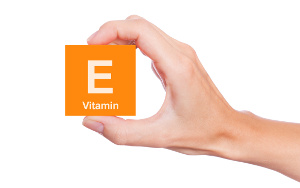 According to an article that is published in StatPearls, vitamin E is a powerful antioxidant that protects against atherosclerosis, cardiovascular disease, and blood clots. Vitamin E is also important for fertility, cell functions, and immune defense. A low-fat diet may result in a vitamin E deficiency. You should also beware that diseases characterized by impaired lipid absorption may increase you need for vitamin E.
According to an article that is published in StatPearls, vitamin E is a powerful antioxidant that protects against atherosclerosis, cardiovascular disease, and blood clots. Vitamin E is also important for fertility, cell functions, and immune defense. A low-fat diet may result in a vitamin E deficiency. You should also beware that diseases characterized by impaired lipid absorption may increase you need for vitamin E.
 Large population studies of adults and their diet habits often tend to overlook certain groups such as younger adults. A British study therefore took a closer look at eating habits of adults in their twenties, thirties, forties, and fifties. It revealed a widespread lack of B vitamins, magnesium, potassium, iodine, zinc, and selenium. Being deficient in these essential nutrients can harm your fertility and increase your risk of different diseases, while speeding up concealed ageing processes such as loss of cognition and bone mass.
Large population studies of adults and their diet habits often tend to overlook certain groups such as younger adults. A British study therefore took a closer look at eating habits of adults in their twenties, thirties, forties, and fifties. It revealed a widespread lack of B vitamins, magnesium, potassium, iodine, zinc, and selenium. Being deficient in these essential nutrients can harm your fertility and increase your risk of different diseases, while speeding up concealed ageing processes such as loss of cognition and bone mass.
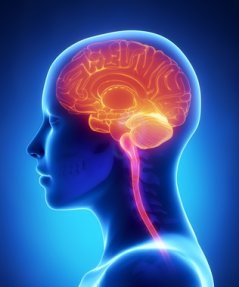 Vitamin C is extremely important for the brain’s blood vessels, nerve cells, neurotransmitters, and connective tissue. An estimated 10 percent of the adult population is vitamin C deficient without specific symptoms. According to a scientific article in the Danish journal Aktuel Videnskab, vitamin C deficiency during pregnancy may harm brain development in the fetus.
Vitamin C is extremely important for the brain’s blood vessels, nerve cells, neurotransmitters, and connective tissue. An estimated 10 percent of the adult population is vitamin C deficient without specific symptoms. According to a scientific article in the Danish journal Aktuel Videnskab, vitamin C deficiency during pregnancy may harm brain development in the fetus.
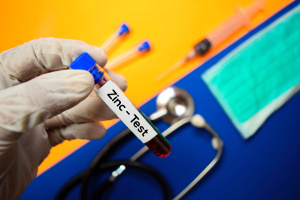 It is commonly known that zinc boosts the immune defense, although there has been some uncertainty about how. A team of scientists from Fred Hutchinson Cancer Research Center in the United States therefore decided to look closer at the subject and they found that zinc is important for T cell activity and for the thymus that produces the T cells. The scientists say that this new insight may be useful for the development of new therapies for patients with compromised immune systems. Apparently, zinc deficiencies are rather widespread and this increases the risk of infections where T cells play a key role in supporting the immune function.
It is commonly known that zinc boosts the immune defense, although there has been some uncertainty about how. A team of scientists from Fred Hutchinson Cancer Research Center in the United States therefore decided to look closer at the subject and they found that zinc is important for T cell activity and for the thymus that produces the T cells. The scientists say that this new insight may be useful for the development of new therapies for patients with compromised immune systems. Apparently, zinc deficiencies are rather widespread and this increases the risk of infections where T cells play a key role in supporting the immune function.
 Zinc strengthens the immune defense and controls inflammatory conditions such as eczema. According to a Finnish meta-analysis, high-dosed zinc supplements can help the immune defense fight a regular cold much faster. It turns out that there are widespread zinc deficiencies. First of all, sugar, birth control pills, inorganic iron supplements, and normal ageing processes impair the body’s zinc uptake. Secondly, it may be difficult to get enough zinc if you are on a vegetarian or vegan diet. Not only does a zinc deficiency have a negative effect on your immune defense and skin health, it also upsets the countless enzymatic processes in which zinc is involved.
Zinc strengthens the immune defense and controls inflammatory conditions such as eczema. According to a Finnish meta-analysis, high-dosed zinc supplements can help the immune defense fight a regular cold much faster. It turns out that there are widespread zinc deficiencies. First of all, sugar, birth control pills, inorganic iron supplements, and normal ageing processes impair the body’s zinc uptake. Secondly, it may be difficult to get enough zinc if you are on a vegetarian or vegan diet. Not only does a zinc deficiency have a negative effect on your immune defense and skin health, it also upsets the countless enzymatic processes in which zinc is involved.
- here is a check list of typical signs and diseases
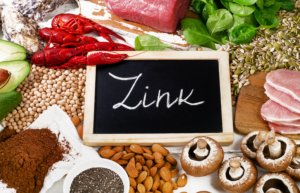 An estimated two billion people worldwide lack zinc. The essential trace element is involved in more than 1,000 different enzyme processes, besides being a powerful antioxidant that protects the body’s cells. Even minor zinc deficiencies can lead to impaired digestion, infections, skin problems, fatigue, impaired fertility, and DNA damage. Such deficiencies can eventually increase the risk of cancer and other diseases. People with unhealthy diets, vegetarians, vegans, older people, and pregnant and breastfeeding women are at particular risk of lacking zinc. Even if your diet provides sufficient amounts of zinc, different factors can affect the uptake and utilization of the nutrient, thereby increasing your body’s actual need.
An estimated two billion people worldwide lack zinc. The essential trace element is involved in more than 1,000 different enzyme processes, besides being a powerful antioxidant that protects the body’s cells. Even minor zinc deficiencies can lead to impaired digestion, infections, skin problems, fatigue, impaired fertility, and DNA damage. Such deficiencies can eventually increase the risk of cancer and other diseases. People with unhealthy diets, vegetarians, vegans, older people, and pregnant and breastfeeding women are at particular risk of lacking zinc. Even if your diet provides sufficient amounts of zinc, different factors can affect the uptake and utilization of the nutrient, thereby increasing your body’s actual need.
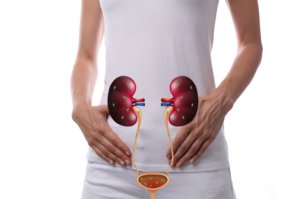 Bladder infection is one of the most widespread bacterial infections. It can lead to serious complications such as kidney infections and blood poisoning. A team of scientists from University of Queensland in Australia has discovered new details about zinc and its role in the immune defense, and how zinc helps the white blood cells fight coli bacteria that are the main cause of bladder infections. Women are more exposed than men, and there are some rather easy ways for them to prevent coli bacteria from spreading to the urinary tract.
Bladder infection is one of the most widespread bacterial infections. It can lead to serious complications such as kidney infections and blood poisoning. A team of scientists from University of Queensland in Australia has discovered new details about zinc and its role in the immune defense, and how zinc helps the white blood cells fight coli bacteria that are the main cause of bladder infections. Women are more exposed than men, and there are some rather easy ways for them to prevent coli bacteria from spreading to the urinary tract.
 The mineral zinc has demonstrated a surprising ability to help the liver fight virus infections and prevent tissue damage caused by chronic liver diseases. By regulating a specific protein, zinc both strengthens the immune defense and counteracts undesirable inflammation. This was shown in a new Australian study headed by scientists from Westmead Institute for Medical Research.
The mineral zinc has demonstrated a surprising ability to help the liver fight virus infections and prevent tissue damage caused by chronic liver diseases. By regulating a specific protein, zinc both strengthens the immune defense and counteracts undesirable inflammation. This was shown in a new Australian study headed by scientists from Westmead Institute for Medical Research.
It also turns out that minor to moderate zinc deficiencies are rather common. Most importantly, sugar, birth control pills, inorganic iron supplements, and ageing processes impair the body’s ability to absorb zinc. Moreover, it is often difficult to get enough zinc from vegetarian and vegan diets. Being zinc-deficient takes its toll on the immune system and the liver, but also has a negative impact on the countless enzyme processes that involve zinc.
– but will enrichment do the trick?
 Even minor zinc deficiencies may cause poor digestion, infections, skin problems, and fatigue – and many other diseases may occur along the way. A new study shows that a diet with as little as four extra mg of zinc daily may strengthen cellular DNA and help protect the body. The four milligrams of zinc are about the same as populations with deficiency symptoms can get by eating zinc-enriched wheat and rice.
Even minor zinc deficiencies may cause poor digestion, infections, skin problems, and fatigue – and many other diseases may occur along the way. A new study shows that a diet with as little as four extra mg of zinc daily may strengthen cellular DNA and help protect the body. The four milligrams of zinc are about the same as populations with deficiency symptoms can get by eating zinc-enriched wheat and rice.
 According to the statistics, far too many patients contract an infection while being hospitalized in a Danish hospital. This has enormous human and economic costs that need to be addressed. Hospital infections are not only a consequence of poor hygiene, it actually turns out that 40 percent of the patients are malnourished to some degree, which impairs their immune system and makes them an easier target for infections. Lack of vitamin C, vitamin D, selenium, zinc, and iron seem to be the big and overlooked problem.
According to the statistics, far too many patients contract an infection while being hospitalized in a Danish hospital. This has enormous human and economic costs that need to be addressed. Hospital infections are not only a consequence of poor hygiene, it actually turns out that 40 percent of the patients are malnourished to some degree, which impairs their immune system and makes them an easier target for infections. Lack of vitamin C, vitamin D, selenium, zinc, and iron seem to be the big and overlooked problem.











 Even if you eat a healthy and balanced diet, it can be difficult to get enough
Even if you eat a healthy and balanced diet, it can be difficult to get enough  According to a new study from Johns Hopkins University in the United States,
According to a new study from Johns Hopkins University in the United States, 
 A new American study shows that chronic alcohol abuse impairs the ability of the pancreas to absorb
A new American study shows that chronic alcohol abuse impairs the ability of the pancreas to absorb  Even the earliest ageing processes are known to damage central parts of our immune system, leaving us more exposed to infection, inflammation, and cancer. However, new studies demonstrate that antioxidants such as
Even the earliest ageing processes are known to damage central parts of our immune system, leaving us more exposed to infection, inflammation, and cancer. However, new studies demonstrate that antioxidants such as  It is estimated that one billion people worldwide lack
It is estimated that one billion people worldwide lack  Melanoma is a type of malignant skin cancer that spreads rapidly. Being vitamin D-deficient doubles the risk of dying of the disease, according to a Spanish study that was presented at the European Academy of Dermatology and Venereology congress. It is commonly known that sunburns, which one should generally avoid, increase the risk of contracting skin cancer. But we must not forget that the summer sun is our main source of
Melanoma is a type of malignant skin cancer that spreads rapidly. Being vitamin D-deficient doubles the risk of dying of the disease, according to a Spanish study that was presented at the European Academy of Dermatology and Venereology congress. It is commonly known that sunburns, which one should generally avoid, increase the risk of contracting skin cancer. But we must not forget that the summer sun is our main source of  Around 25 percent of adults have had canker sores, also referred to as recurrent aphthous stomatitis (RAS). The condition is characterized by painful, superficial sores, and we don’t know all that much about what causes it or how to treat it. However, according to a meta-analysis that is published in Frontiers in Nutrition, a possible cause may be low blood levels of
Around 25 percent of adults have had canker sores, also referred to as recurrent aphthous stomatitis (RAS). The condition is characterized by painful, superficial sores, and we don’t know all that much about what causes it or how to treat it. However, according to a meta-analysis that is published in Frontiers in Nutrition, a possible cause may be low blood levels of 
 The coronavirus has spread from Wuhan in China to a number of continents, where it has caused massive fear and affected daily life and the global economy. Although most people that get the infection experience a mild course of events, the greatest fear is the potentially life-threatening complications in the respiratory system caused by oxidative stress, which have already taken thousands of human lives. Chinese scientists now call for early intravenous therapy with large doses of vitamin C to prevent oxidative stress and the life-threatening complications that follow in the wake of a derailed immune system. Many researchers also claim that higher intake of vitamin C from dietary sources or supplements help prevent by boosting and regulating the immune system in the upper respiratory tract. The same goes for vitamin D and selenium.
The coronavirus has spread from Wuhan in China to a number of continents, where it has caused massive fear and affected daily life and the global economy. Although most people that get the infection experience a mild course of events, the greatest fear is the potentially life-threatening complications in the respiratory system caused by oxidative stress, which have already taken thousands of human lives. Chinese scientists now call for early intravenous therapy with large doses of vitamin C to prevent oxidative stress and the life-threatening complications that follow in the wake of a derailed immune system. Many researchers also claim that higher intake of vitamin C from dietary sources or supplements help prevent by boosting and regulating the immune system in the upper respiratory tract. The same goes for vitamin D and selenium. It has already been documented that the widespread problems with vitamin D deficiency increase the risk of being infected with COVID-19 and developing life-threatening complications. In a new study, a team of Turkish scientists has demonstrated that swift treatment with
It has already been documented that the widespread problems with vitamin D deficiency increase the risk of being infected with COVID-19 and developing life-threatening complications. In a new study, a team of Turkish scientists has demonstrated that swift treatment with 
 The summer sun is our most important source of
The summer sun is our most important source of 

 According to a new study that is published in the British Journal of Nutrition, even minor
According to a new study that is published in the British Journal of Nutrition, even minor  The most common term for this nutrient is folic acid, whereas vitamin B9 is hardly ever used. Folic acid is the synthetic form that is found in vitamin pills, while folate and folacin are the forms of the nutrient that are found naturally in food. Folic acid is very stable and gets converted into folate in the body. The vitamin is water-soluble. Most of it gets stored in the liver, which contains around half the body's total amount of folate. The nutrient is destroyed by boiling and heating.
The most common term for this nutrient is folic acid, whereas vitamin B9 is hardly ever used. Folic acid is the synthetic form that is found in vitamin pills, while folate and folacin are the forms of the nutrient that are found naturally in food. Folic acid is very stable and gets converted into folate in the body. The vitamin is water-soluble. Most of it gets stored in the liver, which contains around half the body's total amount of folate. The nutrient is destroyed by boiling and heating. Modern man is exposed to a lot of free radicals because of factors like stress, environmental toxins, etc. Free radicals are like “internal terrorists” that contribute to atherosclerosis, diabetes, Alzheimer’s disease, cancer, and a host of other diseases. Our only protection against free radicals are antioxidants from vitamins, minerals, and plant compounds. Antioxidants work in different ways. Being deficient in a single primary antioxidant such as selenium may leave the body vulnerable to oxidative stress and disease. What most people are unaware of is that free radicals are also essential, as they are a part of our energy turnover and immune defense. The question is how do we protect ourselves the best against infections, oxidative stress, and disease? What type of antioxidant do we get from dark chocolate, green tea, coffee and red wine? How does redox therapy with vitamin C in great quantities work on cancer patients? You can read more about these topics in the following.
Modern man is exposed to a lot of free radicals because of factors like stress, environmental toxins, etc. Free radicals are like “internal terrorists” that contribute to atherosclerosis, diabetes, Alzheimer’s disease, cancer, and a host of other diseases. Our only protection against free radicals are antioxidants from vitamins, minerals, and plant compounds. Antioxidants work in different ways. Being deficient in a single primary antioxidant such as selenium may leave the body vulnerable to oxidative stress and disease. What most people are unaware of is that free radicals are also essential, as they are a part of our energy turnover and immune defense. The question is how do we protect ourselves the best against infections, oxidative stress, and disease? What type of antioxidant do we get from dark chocolate, green tea, coffee and red wine? How does redox therapy with vitamin C in great quantities work on cancer patients? You can read more about these topics in the following.
 The most harmful heavy metals are mercury, cadmium, lead, nickel, and cobber, but aluminum, fluoride, iron, and calcium can also be toxic. Poisoning with heavy metals and minerals blocks other minerals such as selenium, iodine, magnesium, and zinc, all of which support numerous essential enzyme processes. At the same time, if you lack these important minerals, heavy metals are able to cause unhindered damage and increase your risk of impaired immunity, impaired fertility, autoimmune diseases, thyroid diseases, brain damage, neurological diseases, depression, hypersensitivity, etc. Chronic heavy metal toxicity is an overlooked problem, but in this article, you can read more about the subject and find out how to deal with it.
The most harmful heavy metals are mercury, cadmium, lead, nickel, and cobber, but aluminum, fluoride, iron, and calcium can also be toxic. Poisoning with heavy metals and minerals blocks other minerals such as selenium, iodine, magnesium, and zinc, all of which support numerous essential enzyme processes. At the same time, if you lack these important minerals, heavy metals are able to cause unhindered damage and increase your risk of impaired immunity, impaired fertility, autoimmune diseases, thyroid diseases, brain damage, neurological diseases, depression, hypersensitivity, etc. Chronic heavy metal toxicity is an overlooked problem, but in this article, you can read more about the subject and find out how to deal with it. HIV, the virus that causes AIDS, is potentially life-threatening because it attacks central cells in the immune defense. It has also been documented that HIV patients have an increased risk of lacking
HIV, the virus that causes AIDS, is potentially life-threatening because it attacks central cells in the immune defense. It has also been documented that HIV patients have an increased risk of lacking  Lack of
Lack of  Ageing is linked to uncontrolled, low-grade inflammation, also known as inflammaging, according to articles published in the journals Nature Medicine and Ageing and Disease. Although chronic inflammation is not felt directly it may set the stage for cardiovascular disease, rheumatism, Alzheimer’s disease, and cancer. Chronic inflammation may also cause virus infections like influenza and COVID-19 to become life-threatening because the immune defense suddenly overreacts and attacks healthy tissue. It is therefore vital for ageing people to protect themselves against chronic inflammation, which means getting plenty of vitamin D, selenium, coenzyme Q10, zinc, omega-3, and melatonin. These are all things that many older people often lack.
Ageing is linked to uncontrolled, low-grade inflammation, also known as inflammaging, according to articles published in the journals Nature Medicine and Ageing and Disease. Although chronic inflammation is not felt directly it may set the stage for cardiovascular disease, rheumatism, Alzheimer’s disease, and cancer. Chronic inflammation may also cause virus infections like influenza and COVID-19 to become life-threatening because the immune defense suddenly overreacts and attacks healthy tissue. It is therefore vital for ageing people to protect themselves against chronic inflammation, which means getting plenty of vitamin D, selenium, coenzyme Q10, zinc, omega-3, and melatonin. These are all things that many older people often lack. Chronic fatigue commonly follows in the wake of influenza, herpes, COVID-19, and other infections. The immune system does not function optimally, and the tiredness is caused by oxidative stress and inflammation. The condition is often accompanied by poor concentration, depression, and sleep disturbances. Oxidative stress is an imbalance between pro-inflammatory free radicals and protective antioxidants.
Chronic fatigue commonly follows in the wake of influenza, herpes, COVID-19, and other infections. The immune system does not function optimally, and the tiredness is caused by oxidative stress and inflammation. The condition is often accompanied by poor concentration, depression, and sleep disturbances. Oxidative stress is an imbalance between pro-inflammatory free radicals and protective antioxidants.  Minerals are involved in countless functions of vital importance to the immune defense. That is why lack of one or several minerals can increase your risk of infections or perhaps trigger unwanted inflammation that can damage healthy tissue. In a new review article that is published in Nutrients, a group of scientists look at magnesium, selenium, zinc, iron, and copper and their role in the immune system. They also look at the fact that vegans, older people, chronically ill, pregnant women, and elite athletes often have nutrient deficiencies that call for supplementation. The agricultural soil in Europe and many other parts of the world is selenium-depleted, which makes it challenging to get enough selenium from our diets. But it is also important not to overdose on minerals. In this article, you can read more about how to optimize your nutrient intake for your immune health.
Minerals are involved in countless functions of vital importance to the immune defense. That is why lack of one or several minerals can increase your risk of infections or perhaps trigger unwanted inflammation that can damage healthy tissue. In a new review article that is published in Nutrients, a group of scientists look at magnesium, selenium, zinc, iron, and copper and their role in the immune system. They also look at the fact that vegans, older people, chronically ill, pregnant women, and elite athletes often have nutrient deficiencies that call for supplementation. The agricultural soil in Europe and many other parts of the world is selenium-depleted, which makes it challenging to get enough selenium from our diets. But it is also important not to overdose on minerals. In this article, you can read more about how to optimize your nutrient intake for your immune health. Many people take a multivitamin this time of year. However, even if the manufacturers really squeeze together the ingredients it is impossible to put enough vitamins and minerals in one pill to cover our actual needs. In fact, the manufacturing process determines if we are able to absorb the different nutrients in the first place, and that is important for them to work properly in the body. Therefore, it is vital that you choose a supplement that has good quality, and you must make sure to focus on the vitamins, minerals, and essential fatty acids that we humans typically tend to lack.
Many people take a multivitamin this time of year. However, even if the manufacturers really squeeze together the ingredients it is impossible to put enough vitamins and minerals in one pill to cover our actual needs. In fact, the manufacturing process determines if we are able to absorb the different nutrients in the first place, and that is important for them to work properly in the body. Therefore, it is vital that you choose a supplement that has good quality, and you must make sure to focus on the vitamins, minerals, and essential fatty acids that we humans typically tend to lack.

 Nothing beats a good night’s sleep. Still, sleep disturbances are widespread, and surprisingly many people struggle through the day, trying to survive on far too much coffee and other stimulants – and they cannot do anything about the problem. It turns out that many vegetarians, users of birth control pills, older people, and diabetics suffer from sleep problems because they lack
Nothing beats a good night’s sleep. Still, sleep disturbances are widespread, and surprisingly many people struggle through the day, trying to survive on far too much coffee and other stimulants – and they cannot do anything about the problem. It turns out that many vegetarians, users of birth control pills, older people, and diabetics suffer from sleep problems because they lack  Vitamin D’s role in maintaining proper health is well documented. Still, many older people lack the nutrient and that increases their risk of bone fractures, blood poisoning, and disease complications that can eventually lead to hospitalization. Also, they risk prolonged hospitalization according to a new Irish study published in the scientific journal Nutrients. The scientists recommend giving vitamin D supplements to seniors to increase their blood levels of vitamin D. Other studies even suggest that this can protect against COVID-19, as low vitamin D status is associated with an increased risk of being hospitalized with the disease.
Vitamin D’s role in maintaining proper health is well documented. Still, many older people lack the nutrient and that increases their risk of bone fractures, blood poisoning, and disease complications that can eventually lead to hospitalization. Also, they risk prolonged hospitalization according to a new Irish study published in the scientific journal Nutrients. The scientists recommend giving vitamin D supplements to seniors to increase their blood levels of vitamin D. Other studies even suggest that this can protect against COVID-19, as low vitamin D status is associated with an increased risk of being hospitalized with the disease.
 Hashimoto’s disease (Hashimoto’s thyroiditis) is an overlooked scourge that leads to hypothyroidism and is particularly widespread among women. Postpartum thyroiditis that also slows down your metabolism follows in the wake of pregnancy. Graves’ disease where the metabolism speeds up (hyperthyroidism) is less common. These three thyroid disorders belong to the group of autoimmune disorders where the immune defense attacks the body’s tissues, and it appears that lack of
Hashimoto’s disease (Hashimoto’s thyroiditis) is an overlooked scourge that leads to hypothyroidism and is particularly widespread among women. Postpartum thyroiditis that also slows down your metabolism follows in the wake of pregnancy. Graves’ disease where the metabolism speeds up (hyperthyroidism) is less common. These three thyroid disorders belong to the group of autoimmune disorders where the immune defense attacks the body’s tissues, and it appears that lack of  It is hardly a coincidence that sore throats, colds, flus, and related complications such as sinus infections and pneumonia typically circulate during the winter period. They are primarily a result of having low
It is hardly a coincidence that sore throats, colds, flus, and related complications such as sinus infections and pneumonia typically circulate during the winter period. They are primarily a result of having low  Levels of
Levels of  We need plenty of
We need plenty of 
 Nowadays, fruit, potatoes, and vegetables in general contain very little
Nowadays, fruit, potatoes, and vegetables in general contain very little  More than 25 percent of people older than 65 years have low levels of vitamin D in their blood. Deficiencies in vitamin B12, folic acid, and iron are also common. This is the conclusion of a large study that was conducted by scientists from Helmholtz Zentrum in Munich, Germany. The widespread lack of vitamins and minerals among older people is critical, especially because this population group is increasing. The lack of essential nutrients affects the calcium uptake, immune defense, and nervous system among other things, leaving older people increasingly vulnerable to osteoporosis, influenza, dementia, and a host of other diseases that impair quality of life and burden the entire public health sector.
More than 25 percent of people older than 65 years have low levels of vitamin D in their blood. Deficiencies in vitamin B12, folic acid, and iron are also common. This is the conclusion of a large study that was conducted by scientists from Helmholtz Zentrum in Munich, Germany. The widespread lack of vitamins and minerals among older people is critical, especially because this population group is increasing. The lack of essential nutrients affects the calcium uptake, immune defense, and nervous system among other things, leaving older people increasingly vulnerable to osteoporosis, influenza, dementia, and a host of other diseases that impair quality of life and burden the entire public health sector. We need
We need  Older people can easily become deficient of vitamins and minerals, which can weaken their immune system and make them more prone to infections and prolonged periods with disease. On the other hand, older people who take a multivitamin and mineral supplement with zinc and large quantities of vitamin C experience fewer days with disease and have less severe symptoms, according to a placebo-controlled study from Oregon State University. But many multivitamin supplements do not contain enough vitamin D and it is very important for older people to get enough of this nutrient.
Older people can easily become deficient of vitamins and minerals, which can weaken their immune system and make them more prone to infections and prolonged periods with disease. On the other hand, older people who take a multivitamin and mineral supplement with zinc and large quantities of vitamin C experience fewer days with disease and have less severe symptoms, according to a placebo-controlled study from Oregon State University. But many multivitamin supplements do not contain enough vitamin D and it is very important for older people to get enough of this nutrient.
 Periodontal disease affects most people at some stage in life. However, according to a recent study that is published in Contemporary Clinical Dentistry, supplemental use of Q10 and tea tree oil may have potential benefits.
Periodontal disease affects most people at some stage in life. However, according to a recent study that is published in Contemporary Clinical Dentistry, supplemental use of Q10 and tea tree oil may have potential benefits. According to WHO, sepsis is the third-most common cause of death, following cardiovascular disease and death. Sepsis is a result of the immune defense overreacting to an infection in the bloodstream. According to a new Slovakian study published in Bratislava Medical Journal, if you start supplementing with
According to WHO, sepsis is the third-most common cause of death, following cardiovascular disease and death. Sepsis is a result of the immune defense overreacting to an infection in the bloodstream. According to a new Slovakian study published in Bratislava Medical Journal, if you start supplementing with  More and more people boost their immune with help from Echinacea, ginger, smoothies, and juices packed with vitamin C, antioxidants and secondary immune-strengthening compounds. Nonetheless, none of these otherwise useful strategies can compensate for the widespread lack of vitamin D that is the underlying reason why so many of us contract virus infections during the winter period.
More and more people boost their immune with help from Echinacea, ginger, smoothies, and juices packed with vitamin C, antioxidants and secondary immune-strengthening compounds. Nonetheless, none of these otherwise useful strategies can compensate for the widespread lack of vitamin D that is the underlying reason why so many of us contract virus infections during the winter period.
 During the winter period, many of us have runny noses and some may end up in bed with a bout of flu. Now is the time to prime your immune system by getting all those vitamins and minerals that your diet is not always able to provide you. That way you can ward off germs and avoid unnecessary sick days. But what effect does
During the winter period, many of us have runny noses and some may end up in bed with a bout of flu. Now is the time to prime your immune system by getting all those vitamins and minerals that your diet is not always able to provide you. That way you can ward off germs and avoid unnecessary sick days. But what effect does  Hormonal imbalances have broad implications and increase the risk of chronic fatigue, overweight, impaired fertility, dry mucosa, hot flushes, slow metabolism, breast cancer, and many other problems. Lack of essential nutrients contributes to such disruptions of the sensitive hormone system. This is also the case with hormone-disrupting compounds.
Hormonal imbalances have broad implications and increase the risk of chronic fatigue, overweight, impaired fertility, dry mucosa, hot flushes, slow metabolism, breast cancer, and many other problems. Lack of essential nutrients contributes to such disruptions of the sensitive hormone system. This is also the case with hormone-disrupting compounds. We are constantly being warned about sun exposure and skin cancer. Still, it is important that we get plenty of
We are constantly being warned about sun exposure and skin cancer. Still, it is important that we get plenty of  During the winter period, many people catch a cold or are bed-ridden with a bout of the flu. They may consider this to be perfectly natural, but it is actually a sign of a weakened immune defense, and that makes them susceptible to contamination. What matters is to make sure to get plenty of vitamin D, vitamin C, selenium, and zinc, all of which are nutrients that have different functions in the immune system. Some nutrients are also needed in larger quantities to tackle a beginning infection, and it is important to act quickly in order to nip the infection in the bud.
During the winter period, many people catch a cold or are bed-ridden with a bout of the flu. They may consider this to be perfectly natural, but it is actually a sign of a weakened immune defense, and that makes them susceptible to contamination. What matters is to make sure to get plenty of vitamin D, vitamin C, selenium, and zinc, all of which are nutrients that have different functions in the immune system. Some nutrients are also needed in larger quantities to tackle a beginning infection, and it is important to act quickly in order to nip the infection in the bud. Undernourishment typically affects the elderly, those with diseases, addicts, and people with eating disorders. The condition increases the risk of serious diseases and repeated hospitalizations and is an enormous economic burden to society. Many undernourished people suffer from loss of appetite, a problem that can often be stimulated with improved diets and supplements of
Undernourishment typically affects the elderly, those with diseases, addicts, and people with eating disorders. The condition increases the risk of serious diseases and repeated hospitalizations and is an enormous economic burden to society. Many undernourished people suffer from loss of appetite, a problem that can often be stimulated with improved diets and supplements of If you are vegetarian or vegan you need keen insight in order to know how to get enough protein, vitamins, minerals, fatty acids, and certain amino acids. Lack of essential nutrients can cause anemia and fatigue but may also increase your risk of serious diseases.
If you are vegetarian or vegan you need keen insight in order to know how to get enough protein, vitamins, minerals, fatty acids, and certain amino acids. Lack of essential nutrients can cause anemia and fatigue but may also increase your risk of serious diseases. It came as good news for vegetarians, vegans and sclerosis sufferers when Danish health authorities allowed strong
It came as good news for vegetarians, vegans and sclerosis sufferers when Danish health authorities allowed strong  Tuberculosis is one of the most common diseases in the world and costs millions of lives, especially in the underdeveloped countries. Tuberculosis typically goes hand in hand with malnutrition, and now a group of scientists from Dublin in Ireland has found that
Tuberculosis is one of the most common diseases in the world and costs millions of lives, especially in the underdeveloped countries. Tuberculosis typically goes hand in hand with malnutrition, and now a group of scientists from Dublin in Ireland has found that  Vitamin B12 is a common term for a group of chemically related substances that all have vitamin activity. They are also known as cobalamins. The biosynthesis of the basic structure is handled by bacteria that are found many places in nature. The uptake of vitamin B12 from food requires the presence of the protein intrinsic factor that is formed in the gastric mucosa. Intrinsic factor binds to vitamin B12 and transports it into the body from the small intestine. Coli bacteria in the colon also produce vitamin B12 that is taken up by the body. Vitamin B12 is stored in the liver for up to several months at a time, and we humans are also able to reuse vitamin B12 that has been absorbed from the intestine. It is generally more difficult for the body to absorb vitamin B12 compared with other vitamins, and our ability to take up the nutrient decreases as we grow older. The synthetic basic form of vitamin B12 is used in nutritional supplements and also as a food additive. The dosages are typically rather large in order to ensure sufficient uptake of the nutrient.
Vitamin B12 is a common term for a group of chemically related substances that all have vitamin activity. They are also known as cobalamins. The biosynthesis of the basic structure is handled by bacteria that are found many places in nature. The uptake of vitamin B12 from food requires the presence of the protein intrinsic factor that is formed in the gastric mucosa. Intrinsic factor binds to vitamin B12 and transports it into the body from the small intestine. Coli bacteria in the colon also produce vitamin B12 that is taken up by the body. Vitamin B12 is stored in the liver for up to several months at a time, and we humans are also able to reuse vitamin B12 that has been absorbed from the intestine. It is generally more difficult for the body to absorb vitamin B12 compared with other vitamins, and our ability to take up the nutrient decreases as we grow older. The synthetic basic form of vitamin B12 is used in nutritional supplements and also as a food additive. The dosages are typically rather large in order to ensure sufficient uptake of the nutrient. Intensive care units in hospitals offer treatment for critically ill patients, who are monitored and receive specialist care around the clock. It goes without saying that this type of medical attention is associated with both suffering and comes with a huge price tag. A whole new meta-analysis has shown that
Intensive care units in hospitals offer treatment for critically ill patients, who are monitored and receive specialist care around the clock. It goes without saying that this type of medical attention is associated with both suffering and comes with a huge price tag. A whole new meta-analysis has shown that  There are several kinds of vitamin D with the two most important being:
There are several kinds of vitamin D with the two most important being: More vitamin D may contribute to better blood sugar regulation in type 2 diabetes. Eggs are a good source of vitamin D, but in the winter period it may be a good idea to take a high-dosed supplement.
More vitamin D may contribute to better blood sugar regulation in type 2 diabetes. Eggs are a good source of vitamin D, but in the winter period it may be a good idea to take a high-dosed supplement.
 According to a study that was presented to a group of endocrinologists at an Edinburgh conference, supplements of
According to a study that was presented to a group of endocrinologists at an Edinburgh conference, supplements of  This time of year, many people suffer from asthma, aching joints, or an exacerbation of other chronic diseases that involve inflammation. This is often because they lack
This time of year, many people suffer from asthma, aching joints, or an exacerbation of other chronic diseases that involve inflammation. This is often because they lack It is hardly a coincidence that so many of us contract virus infections in the course of the winter. It is because we lack
It is hardly a coincidence that so many of us contract virus infections in the course of the winter. It is because we lack  Supplementing with high doses of
Supplementing with high doses of 
 Vitamin D2 occurs naturally in foods from the plant kingdom while vitamin D3 comes from animal sources. It is also vitamin D3 that we synthesize in our skin in response to sun exposure. Scientists from the Universities of Surrey and Brighton in Great Britain have now discovered that the two types of
Vitamin D2 occurs naturally in foods from the plant kingdom while vitamin D3 comes from animal sources. It is also vitamin D3 that we synthesize in our skin in response to sun exposure. Scientists from the Universities of Surrey and Brighton in Great Britain have now discovered that the two types of  Immunotherapy has a special potential when used to treat cancer, which is because this particular type of therapy inhibits special molecules that block the body’s own defense mechanism against cancer cells. A team of scientists from Texas has discovered that
Immunotherapy has a special potential when used to treat cancer, which is because this particular type of therapy inhibits special molecules that block the body’s own defense mechanism against cancer cells. A team of scientists from Texas has discovered that  According to an article that is published in StatPearls,
According to an article that is published in StatPearls,  Large population studies of adults and their diet habits often tend to overlook certain groups such as younger adults. A British study therefore took a closer look at eating habits of adults in their twenties, thirties, forties, and fifties. It revealed a widespread lack of B vitamins, magnesium, potassium, iodine, zinc, and selenium. Being deficient in these essential nutrients can harm your fertility and increase your risk of different diseases, while speeding up concealed ageing processes such as loss of cognition and bone mass.
Large population studies of adults and their diet habits often tend to overlook certain groups such as younger adults. A British study therefore took a closer look at eating habits of adults in their twenties, thirties, forties, and fifties. It revealed a widespread lack of B vitamins, magnesium, potassium, iodine, zinc, and selenium. Being deficient in these essential nutrients can harm your fertility and increase your risk of different diseases, while speeding up concealed ageing processes such as loss of cognition and bone mass.
 It is commonly known that
It is commonly known that 
 An estimated two billion people worldwide lack
An estimated two billion people worldwide lack  Bladder infection is one of the most widespread bacterial infections. It can lead to serious complications such as kidney infections and blood poisoning. A team of scientists from University of Queensland in Australia has discovered new details about
Bladder infection is one of the most widespread bacterial infections. It can lead to serious complications such as kidney infections and blood poisoning. A team of scientists from University of Queensland in Australia has discovered new details about  The mineral
The mineral Even minor
Even minor  "After about one week of taking the Q10 supplement I could feel a huge difference," says 23-year old Alan Piccini, who has been suffering from extreme fatigue and muscle aches ever since he was a child.
"After about one week of taking the Q10 supplement I could feel a huge difference," says 23-year old Alan Piccini, who has been suffering from extreme fatigue and muscle aches ever since he was a child. “Taking capsules with co-enzyme Q10 has freed me of the severe side effects of my cholesterol lowering medicine,” Mrs Franken explains.
“Taking capsules with co-enzyme Q10 has freed me of the severe side effects of my cholesterol lowering medicine,” Mrs Franken explains.